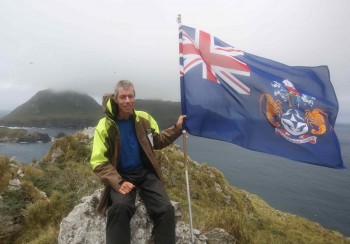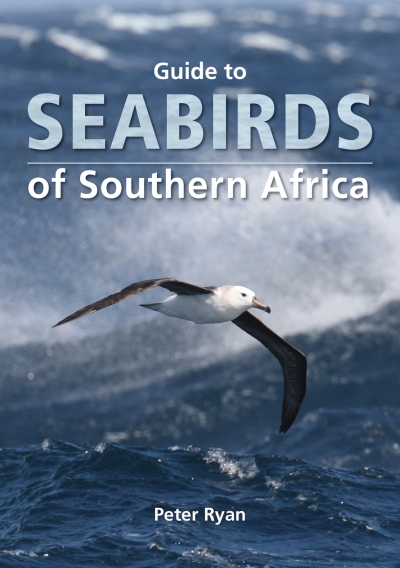Professor Peter Ryan, since 2014 Director of the Percy FitzPatrick Institute of African Ornithology at South Africa’s University of Cape Town has this month been inducted into UCT's prestigious College of Fellows at a ceremony and dinner held earlier this month to “recognise academic staff whose distinguished work deserves special recognition” (click here). UCT’s College of Fellows was established by the UCT Council to recognise distinguished academic work by permanent academic staff.

Peter Ryan in his natural habitat: an uninhabited seabird island in the South Atlantic, photograph by Norman Glass
Peter manages the Institute’s research on albatrosses and petrels at Marion and Gough Islands and at sea in the Southern Ocean within the South African National Antarctic Programme (SANAP), as well as researching and publishing regularly on marine pollution.
Earlier in the year Peter was granted A-rated scientist status by South Africa’s National Research Foundation last month (click here). “A-raters” are researchers who are unequivocally recognised by their peers as leading international scholars in their field for the high quality and impact of their recent research outputs. This is the highest accolade in the NRF’s rating system to rank researchers in South Africa and the first to be awarded to an ornithologist. 2017 also saw Peter receiving the Gilchrist Memorial Medal from the South African Network for Coastal and Oceanic Research (SANCOR) (click here).
The fellowship citation follows:
“Professor Peter Ryan is the director of the FitzPatrick Institute of African Ornithology, a Department of Science and Technology/National Research Foundation (DST-NRF) Centre of Excellence at UCT. His research focuses on understanding and managing environmental issues, primarily those that affect birds.
Ryan was born in the UK in 1962 and has had a stellar academic career since school level, when he was silver medallist in the 1979 Mathematics Olympiad. He obtained both his BSc and BSc (Hons) degrees from UCT with distinction and was awarded the Purcell Memorial Prize for the best zoological dissertation at UCT for both his 1986 MSc (which resulted in eight papers [on plastic pollution in seabirds]) and for his PhD (in 1992). After undertaking his postdoctoral studies at the Museum of Vertebrate Zoology, University of California, Berkeley, he was appointed as a lecturer in the Department of Zoology at UCT in 1993. He rose through the ranks to professor in the Department of Biological Sciences and director of the FitzPatrick Institute in 2014.
Over his career Ryan has authored or co-authored more than 330 peer-reviewed papers (126 as first author) in 88 scientific journals. His main research themes include plastic pollution (35 papers), seabird-fishery interactions and bycatch mitigation (46 papers), seabird monitoring and conservation (40 papers), foraging ecology of seabirds and other marine predators (54 papers), seabird breeding biology (13 papers), other aspects of seabird biology (19 papers), island biology and conservation (45 papers), and avian systematics and evolution (24 papers).
He has also written 12 books, several of which are best sellers; 36 book chapters; and 193 popular and semi-popular articles. He has supervised or co-supervised 19 PhD students, 19 MSc students by dissertation, plus 59 MSc students who are conducting their degrees by coursework and dissertation. Ryan’s H-index is 53 (Google Scholar), and his work has been cited more than 11 300 times (over 5400 times since 2011). He has an A2 rating from the South African National Research Foundation (2017–22).
Ryan is without doubt a leading international expert on the ecology of seabirds (particularly on direct and indirect human impacts on seabird populations), as well as on plastics pollution in the marine environment. His many books and popular articles have also inspired a generation of amateur birders and naturalists. For these many remarkable contributions he richly deserves to be awarded a UCT Fellowship.”

Click here to read a review of Peter’s latest book – on the seabirds of southern Africa.
John Cooper, ACAP Information Officer, 26 October 2017

 English
English  Français
Français  Español
Español